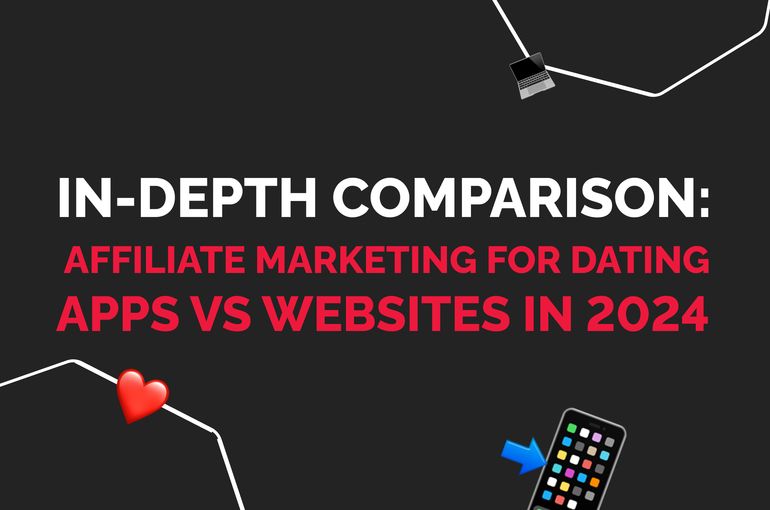10 Trends in Affiliate Marketing for 2024

Affiliate marketing is always on the edge of innovations. To help you keep up with it, we have prepared an overview of the top affiliate marketing trends for 2024. They can significantly refine your strategy — especially in niche markets.
- AI in Affiliate Marketing
- Unified Partnership Approach
- Increased Collaboration
- Rise of Influencers
- Content Diversification
- Data-Driven Strategies
- Improved Affiliate Platforms
- Niche Market Expansion
- More Support for Publishers
- Instead of a conclusion — evaluating the effectiveness of these tendencies
AI in Affiliate Marketing
AI's role in affiliate marketing in 2024 is a nuanced matter for businesses and influencers. On the one hand, it's important to avoid the temptation of viewing AI as a universal remedy or a magical elixir for all marketing woes. On the other hand, AI's assistance can certainly simplify many processes. It is of great help when you need help in streamlining processes, all the while upholding quality standards and safeguarding the interests of our clientele within the realm of sales content.

Now, let's explore the myriad capabilities of AI in content marketing:
- Smart Segmentation
- Automated Outreach
- Trend Analysis
- ROI Tracking
- Fraud Detection
- Competitor Monitoring
- Creative Illustrations
- Dynamic Content Adjustment
- Predictive Customer Behavior
- Efficient Keyword Optimization
- Cross-Platform Integration
As you can see, AI serves as a potent instrument that not only slashes time and costs but also bolsters the effectiveness of our affiliate marketing campaigns. It empowers us to operate with heightened intensity and efficiency by relieving the burden of routine tasks, allowing us to focus on more strategic endeavors.
Unified Partnership Approach
In the affiliate marketing landscape of 2024, the Unified Partnership Approach emerges as a trend emphasizing collaborative bonds among affiliates, marketers, and brands. This approach extends beyond traditional transactions to foster enduring alliances:
- Integration Across Functions: Affiliate managers embedded in marketing, sales, and relevant departments ensure comprehensive support and alignment.
- Expanded Reach: Affiliates drive leads for resellers and partners, greatly amplifying visibility and customer reach.
- Holistic Strategy: Transitioning from siloed functions to an organization-wide approach involves leveraging affiliates across various strategies, enhancing cost-effectiveness and reach.
However, like other 2024 affiliate marketing trends, the Unified Partnership Approach isn't a cure-all and carries its own risks and drawbacks.
Pros | Cons |
|---|---|
- Stronger Relationships | - Complex Coordination |
- Deepens trust between partners. | - Requires more effort to align goals. |
- Enhanced Brand Alignment | - Dependency Risks |
- Cohesive messaging and goals. | - Over-reliance on partners' strategies. |
- Long-Term Growth | - Limited Flexibility |
- Fosters sustainable success. | - Less freedom for quick pivots. |
- Improved Consumer Trust | - Resource Intensive |
- Builds loyalty through consistency. | - Demands more time and resources. |
Increased Collaboration
In a manner reminiscent of the transformations observed in other industries, the landscape of affiliate marketing is undergoing a shift. It's transitioning from a stage characterized by artisanal craftsmanship to one resembling a factory assembly line, and further evolving into a conveyor-belt-like approach to crafting marketing campaigns. This evolution signifies a shift towards more efficient, systematic methodologies within the field. Now, let's delve into the facets of this transformation:
- Data Exchange: Parties engage in the exchange of market and performance data, leading to informed and synergistic strategies that have been proven to enhance the effectiveness of campaigns.
- Enhanced Interaction: The heightened interaction between affiliates and advertisers optimizes efforts, manifesting in more cohesive multi-channel campaigns.
- Strategic Multi-Channel Partnerships: No longer are affiliates and advertisers solitary entities; they are forging strategic, multi-channel partnerships. This trend significantly bolsters efficiency and extends the reach of their respective markets.
- Tactical Content Creation: Content creation is becoming increasingly strategic, driven by SEO strategies that target leads, enhance search performance, and align with prevailing consumer trends.
So, sure, collaboration can bring out great results. However, always mind the potential risks, even if you work with non-traditional niches for affiliate marketing.
Rise of Influencers
In the dynamic world of affiliate marketing, consumer trust follows a cyclical pattern, akin to the eternal wheel of Samsara. This pattern reflects the ebb and flow of trends in the industry.

Every 2-3 years, a significant transformation occurs, marking a key aspect of the latest trends in affiliate marketing. During these periods, influencers rise to prominence, establishing trust through their authenticity and niche authority. These qualities are highly regarded in the ever-evolving landscape of affiliate marketing trends. However, their reign is not eternal and faces challenges from market saturation and changing consumer preferences.
The trust placed in influencers is rooted in their perceived candor and their ability to build close connections with their followers. Nevertheless, as the influencer space becomes increasingly crowded—a clear observation in today's affiliate marketing landscape—their influence can diminish.
Consequently, consumer focus often shifts back to larger, well-established brands. This cyclical transition, emblematic of the industry's dynamic and ever-changing nature, serves as a poignant reflection of the continuously evolving landscape of consumer trust.
Content Diversification
In affiliate marketing, content styles are changing. New formats like Reels, Shorts, and TikToks are becoming popular, but traditional platforms like blogs and emails still play a big role.
Here's a simple look at both. The new formats have evident advantages over traditional ones:
- Short and Catchy: These grab attention fast.
- Great for Trends: They're good for quick, trendy content.
- Perfect for Phones: Made for mobile users.
But it’s not enough just to adopt some of the new formats. See, the content needs to be tailored to each platform's audience intentions, personality, and interaction trends. However, traditional Formats have a few aces up their sleeve as well.
- Detailed Information: These give more information and depth.
- Good for Search Engines: They help people find you on Google.
- Consistent Branding: They keep your message clear.
- Builds Loyal Followers: People come back for more.
Diversifying your content marketing strategy is key in affiliate marketing. By mixing new, quick formats like Reels and TikToks with traditional, in-depth ones like blogs and long videos, you cover all bases. This approach ensures you grab attention fast and keep it, reaching a wide audience while also building a loyal following. It's about blending the instant appeal of new trends with the trusted depth of traditional content.
Data-Driven Strategies

Data-driven strategies are crucial. They help affiliate managers optimize ROI, identify high-performing partners, and avoid actions harming profitability. Data-driven partners excel in the market, earning higher commissions. Similarly, companies leveraging data precisely measure affiliate marketing's impact on lead generation and sales. This approach aligns with the latest affiliate marketing trends in 2024, enhancing performance and success.
Improved Affiliate Platforms
Affiliate marketing in 2024 has witnessed a significant improvement, primarily driven by the evolution of affiliate platforms. These platforms have become more advanced and user-friendly, emphasizing efficiency and ease of use for both affiliates and merchants. They're equipped with smarter technologies that streamline the process of tracking, reporting, and payment, thereby reducing the administrative burden and enhancing accuracy.
Central to this transformation is the introduction of artificial intelligence and machine learning algorithms within these platforms, which have revolutionized how affiliate marketing functions. These technologies enable predictive analytics, helping marketers to identify potential high-performing partnerships and optimize their campaigns in real-time.
They also facilitate personalized affiliate engagements, allowing for more targeted and effective marketing strategies. This level of sophistication in affiliate platforms enhances the performance of individual campaigns and contributes to a more data-driven, results-oriented approach in the affiliate marketing industry.
Moreover, these platforms are designed with adaptability in mind, allowing them to respond to the ever-changing digital marketing environment swiftly. This adaptability extends to accommodating diverse affiliate models and integrating with various eCommerce systems, making them versatile tools in a marketer's arsenal.
The improvement of affiliate platforms represents a fundamental shift in affiliate marketing, signifying a deeper, enduring change that continually shapes the industry's future.
Niche Market Expansion

Instead of trying to reach a lot of different people, you focus on a specific group that's really interested in what you offer. This way, you can create content that's just right for them and build stronger connections. It's like becoming an expert in a smaller area.
This trend is about being more specialized and doing better in smaller markets. It helps you connect with your audience and make more sales because you're giving them exactly what they want. It's like having high-quality partnerships and doing marketing that's just for them.
More Support for Publishers
There is a 2024 trend that offers more help to publishers in affiliate marketing. However, this approach presents certain problems:
- Publishers might rely too much on the help they get, which could make them less creative and independent.
- With more support, publishers might care more about quantity than quality. They could flood the market with content that isn't very good or original.
- Giving more help could make all the publishers do the same things and have the same style. This would make the market less diverse and less competitive.
- If lots of publishers get help, there might be too many of them, and it would be hard for any of them to stand out.
- Giving lots of help takes a lot of resources, and there's a risk that these resources might not be used well.
- More help and resources might make some publishers take risks or do things that aren't allowed, especially if they want to be really aggressive in their marketing.
Thus, adopt a multi-pronged strategy: foster innovation to reduce overdependence, emphasize quality to prevent dilution, encourage diverse strategies for competitiveness, focus on niche markets to avoid saturation, regularly reassess resources for efficiency, and enforce ethical standards. These combined efforts help balance risks and optimize benefits.
Instead of a conclusion — evaluating the effectiveness of these tendencies
Looking into 2024, biggest affiliate marketing trends like Data-Driven Strategies, Rise of Influencers, and Niche Market Expansion are poised to excel, boosting campaign impact and targeting. AI and improved platforms are significant but evolving trends.
Unified Partnerships will likely deepen strategic relationships. However, Increased Collaboration and Publisher Support may face challenges like overreliance and saturation. Content Diversification remains crucial, with its success hinging on balancing new and traditional formats.
Recommended Articles

Website Heat Maps: Increase Conversion and Improve UX For Affiliate Landing Pages With Heatmap Software

Affiliate Marketing for Dating Apps vs. Websites: What’s The Difference?

